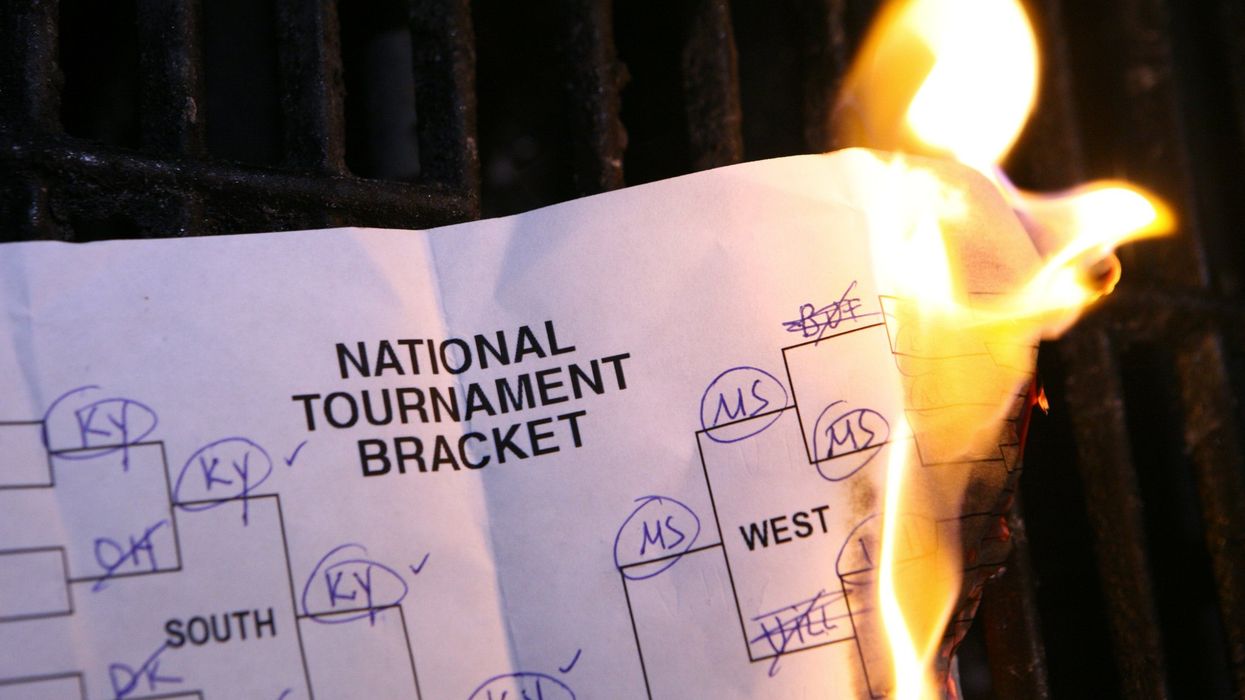
spxChrome/Getty Images

We can learn plenty about American government by our reactions to these NCAA selection committee decisions. Bureaucracies don’t work. Not in sports or in government.
The March Madness brackets are out, and once again, fans are snarling over the selection committee’s treatment of their schools. If you were on social media Sunday night, you’re aware this year’s tournament might have been the most controversial ever.
Some of the questionable decisions included leaving out teams like Cinderella favorite Indiana State, Oklahoma, Pitt, and Rick Pitino’s St. John's squad, while schools like Michigan State and Virginia made the tournament despite weak records. Seeds were also all the talk. Many think Auburn is better than a four seed and questioned Boise State and Colorado being among the last four in while Texas A&M received a higher seed despite a NET ranking that was 20 spots worse.
If only we’d get this riled up over our government’s failures.
Let’s be honest. The NCAA selection committee rarely, if ever, gets it right. We play out this same scenario every year. This time it happens to be only a few months after the outrage over the College Football Playoff Selection Committee that nearly broke the internet by putting Alabama in the playoffs over Florida State.
Has anyone stopped to think about why we, as fans, are always questioning the team selection process?
The answer is obvious when we think about it. These committees are nothing more than bureaucrats, the swamp or deep state of college athletics. They make choices like putting six Mountain West teams in the field but only three from the Big East, and we make charges of outside influences or corruption. Did the committee give some form of DEI-style consideration to the mid-majors in the interest of fairness?
If only we’d get this riled up over our government’s failures. If you’re one of those people who’s worked up about the tournament selections but can’t get your head around Donald Trump’s popularity, perhaps it’s time to re-examine your thinking. There’s a reason that #DrainTheSwamp has trended for most of the last decade.
Bureaucracies don’t work. Not in sports or in government. A small group of so-called experts cannot make decisions that affect millions and get it right once, let alone every single time. It’s impossible. Why? Because bureaucrats have bad incentives and personal biases that affect their decisions. They are human beings, and they simply can’t help it. How else do you explain putting in perennial powerhouses who had down years over the Indiana State Sycamores, led by Robbie Avila (aka Cream Abdul-Jabbar), who haven’t been relevant since Larry Bird wore the blue and white?
While some of you are starting to realize that this premise might be true, you might also be thinking that a democracy is the solution. “Let the fans vote!”
Not so fast. A purely democratic field is problematic too.
First, while there are some teams that so clearly don’t belong that any fan of good conscience would leave them out, there are always bubble teams with a massive fan base that would all but guarantee them a spot in the tournament. In 2024, examples of the former include teams like LSU, Georgia, and Xavier that simply weren’t close this year but usually are.
On the other hand, a 20-win Ohio State team with a NET ranking of 49 and millions of fans and alumni around the country would almost certainly have won a fan vote over the Mountain West’s Boise State, despite Boise's NET ranking of 26.
Next, much like the perverse incentives of the bureaucratic committee, corporate interests in specific teams or players would undoubtedly try to influence the vote. Wouldn’t Nike or Beats by Dre like to see Bronny James in the NCAA Tournament pumping up their brands, regardless of USC’s NET ranking of 88 and Bronny’s measly 4.8 points per game?
Finally, an effective democracy demands an educated electorate. While many of the fans who took to social media expressed an articulate displeasure with the bureaucratic swamp known as the selection committee, don’t forget that they aren’t the only ones voting.
What percentage of East Coast voters have stayed up late for a Washington State game and can tell you how good freshman Myles Rice is? How about the number of voters who know that Tyon Grant-Foster is an NBA-caliber star who can take over a game for 27-win Grand Canyon University, despite nearly dying in the DePaul locker room 16 months ago? These are the stories that make March Madness special, and a vote of the fans will likely deprive us of all of it.
As you see the perils of a true democratic tournament field, does it make you question whether you should care when Joe Biden whispers (or yells — it’s always one of the two) that “our democracy’s at stake”?
We can learn plenty about American government by our reactions to these NCAA selection committee decisions. In the case of America, the founders got it right by restricting the size and scope of what the government can actually do. Neither bureaucratic fiat nor the mob rule of direct democracy usually result in wise decisions or justice.
In the case of the NCAA, keep using specific criteria for automatic qualifiers and choose the rest with a ranking system like NET or KenPom that everyone can agree upon at the beginning of the season. That way, missing the tournament is no one’s fault but your own.
David M. Rich